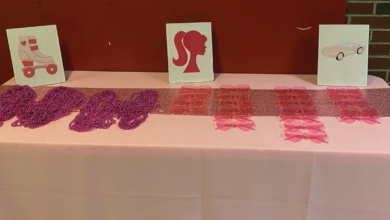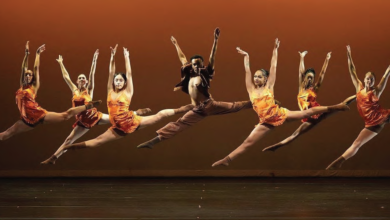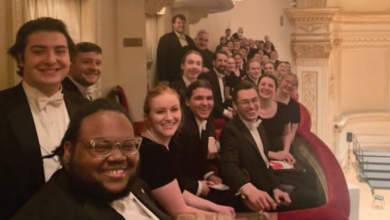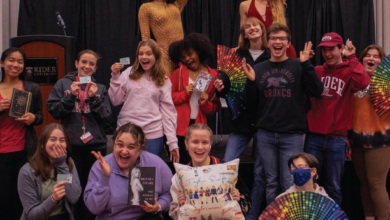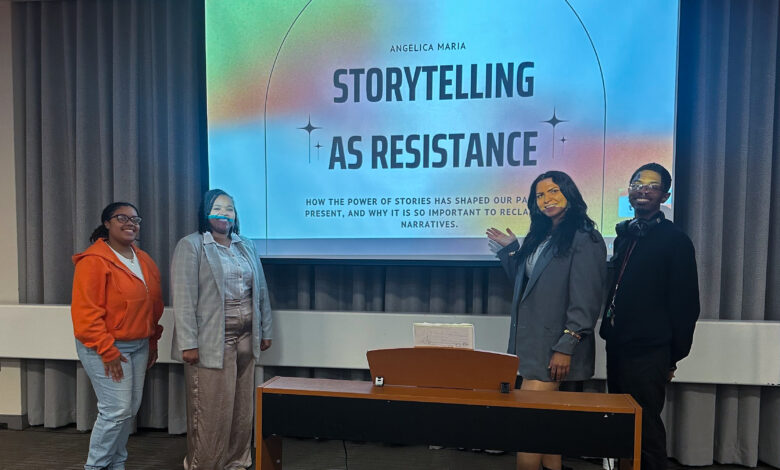
Chicana poet ‘empowhers’ students to speak out
By Grace Bertrand
STUDENTS gathered in a crowded room on the third floor of the Franklin F. Moore Library on Feb. 26 to educate themselves on books that have been banned or challenged by public schools, universities and libraries.
Angélica María, a Chicana poet and musician, catapulted herself headfirst into music and poetry at a young age. Through her discovery of the writing medium, she felt empowered to help young students become confident in their own skin and speak out.
“When you choose art and you choose a creative life, you’re choosing to create your life,” said María.
On March 10, the Center for Diversity and Inclusion invited María to the NJM Room to host a poetry workshop of over 40 students, specially curated for Womxn’s History Month. Living in both Los Angeles and Mexico City, María has conducted various poetry workshops across universities nationwide since before the pandemic in 2020.
Her workshops range from topics such as “Say My Name,” where writers learn to reclaim the power of their names and “A Pledge to the Body,” where writers learn to uproot the shame and insecurities of their bodies, to “Speak Up & Speak Out,” where writers use poetry to speak out against sexual assault.
“Whether it’s a poem or thinking about something differently, or even remembering one of the performance pieces, I want something to stick with [students] when they walk out of here,” said Jasmine Johnson, director of the CDI.
To kickstart the night, María performed a fusion of personal poems and music that incorporated interconnected themes of reclaiming toxic narratives. These four poems included “Exotic,” a light-hearted piece about eating a man for dinner, “Ode to Eve,” an embracing of the villainization of women, “To the girls with long names,” a celebration of the women in María’s family with long names and “They call me bien creido,” a negative term in Spanish used for a woman who is full of herself.
“I really wanted my poems to be more women-centered because it’s womxn’s month,” said María. “I would say naturally my poems and music are always women-borned.”
After performing her pieces for an hour, María turned the spotlight to the audience with a writing workshop and open-mic session that allowed students to write their own pieces pertaining to their names, bodies and any insecurities or narratives they wanted to reclaim.
After around an hour of looking over students’ shoulders with pressure and gathering shy volunteers to overcome their stage fright, the open-mic portion of the evening began. One by one, 19 students made their way to the front of the room to read aloud their poems on insecurities about their curly hair, non-American names, body parts, past mistakes, and forgotten histories.
Cassie Rudolph, a junior game design major and treasurer of Rider Poets, shared her empowering poem about the insecurity she felt in what she named her “strawberry arms.”
“My arms have always been a very odd point of contention in my body,” said Rudolph. “I’ve always had a bit of a hard time coming to terms with it, but I did and now I love it. I trained my arms to be machines of creativity.”
Dealing with what Rudolph calls a “triple threat” of eczema, Keratosis pilaris and rosacea, she expressed that poetry often felt like the only place she could air her grievances about her arms.
“Because [poetry] has a connotation of feeling and artistic expression more than a lot of other writing mediums, it allows both free thought and a lot of emotion,” said Rudolph. “Poetry just seems to flow and reach from your heart rather than your head.”
María shared a similar sentiment to Rudolph, explaining how poetry had been a driving force in her personal life. She expressed how poetry gave her the ability to take back her power and identity as a Chicana.
“I feel like my history is around me all the time and I can’t ignore it, but there are also parts of my culture that I’m interested in reframing and rewriting,” said María.
The CDI partnered with four student organizations for the event, including the Student Government Association, Rider Poets, Rider DominiRicans and Lambda Theta Phi Latin fraternity.
Johnson explained how important it was for the CDI to partner with student organizations for this event, calling them the “backbone” of the university, which is coincidentally the exact label María gave to women: “I just feel like women are the backbone of the world.”
“To me, celebrating women is just something that is long overdue and can never be done enough,” said María.
